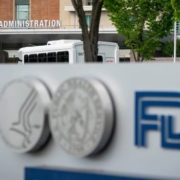Legend Biotech has a target action date of February 28 for the company’s BLA for ciltacabtagene autoleucel (cilta-cel) for adults with relapsed and/or refractory multiple myeloma. The BLA was submitted by Legend’s collaboration partner, Janssen Biotech Inc., a Johnson & Johnson company.
Small children getting less sick from Omicron; Genetic mutation protects against severe COVID
BNT162b2 (Pfizer and BioNTech), Breakthrough COVID-19, Children, COVID-19 Vaccines, Delta Variant (B.1.617.2; India), Genetic Mutations, JAMA, mRNA-1273/Moderna COVID-19 Vaccine (Moderna), Nature Genetics, Omicron (B.1.1.529) (South Africa), R&D, Researchers, Severe Covid-19In very young children, the Omicron variant of the coronavirus causes less severe disease than the Delta variant, according to a new study. In other research, new findings add to evidence that people with a certain version of a gene are less likely to develop severe COVID-19.
With $19 million in seed funding led by the Retinal Degeneration Fund, Opus Genetics launched with a mission to develop gene therapies for rare forms of blindness driven by genetic mutations.
Shares of bluebird bio climbed in trading after the company announced on March 10 that analyses demonstrate the lentiviral vector BB305 was unlikely to be the cause of acute myeloid leukemia (AML) reported in an early-stage clinical study of LentiGlobin for sickle cell disease.
Alnylam Pharmaceuticals presented complete results from the company’s ILLUMINATE-B Phase III study in children under 6 years with primary hyperoxaluria type 1 (PH1), a rare disorder affecting the kidneys.
An experimental Amgen Inc. drug that targets a specific genetic mutation shrank tumors in 32% of advanced lung cancer patients and 7% of those with colon cancer, according to data from an early-stage trial.
Mutated COVID-19 Viral Strain in U.S. and Europe 10 Times More Contagious than Original Strain
ACE2 (angiotensin-converting enzyme-2), Asia, Cells, Coronavirus Disease 2019 (COVID-19), Europe, Genetic Mutations, Institutes, Mutations, Proteins, R&D, Researchers, Scripps Research Institute, Studies, United StatesResearchers at the The Scripps Research Institute found that the strains spreading so quickly in Europe and the U.S. have a mutated S “spike” protein that makes it about 10 times more infectious than the strain that originally was identified in Asia.
The U.S. Food and Drug Administration approved Clovis Oncology Inc.’s drug Rubraca for the treatment of adult patients with metastatic castration-resistant prostate cancer, whose tumors have a genetic mutation.
The first treatment for adult patients with metastatic non-small cell lung cancer (NSCLC) who also have a specific genetic mutation was approved by the U.S. Food and Drug Administration.
Germany’s drug assessment body said data provided by Bayer on the precision cancer drug Vitrakvi did not provide clear enough evidence of benefits, in a setback to the drugmaker in the company’s home market.








